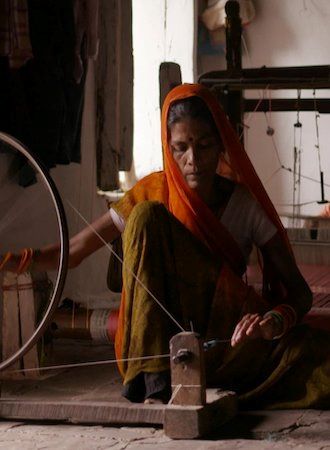
Threads: Sustaining India's Textile Traditions 2022
Distributed by Documentary Educational Resources, 108 Water Street, 5A, Watertown, MA 02472; 617-926-0491
Produced by Katherine Sender and Shuchi Kothari
Directed by Katherine Sender and Shuchi Kothari
Streaming, 58 mins
High School - General Adult
Ecological Living; Economics; Textiles
Date Entered: 02/15/2023
Reviewed by Michael J. Coffta, Business Librarian, Bloomsburg University of PennsylvaniaThis modestly titled work laudably explores the hand-made garment industry in India. While such cottage industries have suffered worldwide due to globalization, Indian artisans, weavers, and designers have seemingly perfected a sustainable exemplar to both provide meaningful, prosperous employment, but carry-on traditions.
This domestic industry is not to be misunderstood as obstinately resistant to global market forces. Rather, the film illustrates how the industry adapts. Many ideas for garment patterns are found online. Clothing lines are promoted at fashion shows inside and outside India. Further, there appears to be an understood unity of branding Indian textiles as high-quality works of dedication and tradition. Also implicit in this model is its sustainability. Managers work to create recession-resistant shop practices and seem to resist the temptation to become suppliers rather than proud producers of finished goods.
Stylistically, the audience is treated to displays of incredibly ornate designs. One must admire the dexterity needed to operate the rhythmic hand looms. The film is filled with aphorisms, such as, "Fashion is the enemy of craft," and "Sustainability only will come with utility."
Where this film stands out as a demonstrative yet argumentative portrayal of a "win-win, win-win" broadly-based enterprise nimbly incorporating economic and environmental sustainability, with tradition and grand artistry. Students and other viewers may explore the fascinating question of how or if such a model could be applied by other countries and industries.
Published and licensed under the Creative Commons Attribution 4.0 license. Anyone can use these reviews, so long as they comply with the terms of the license.